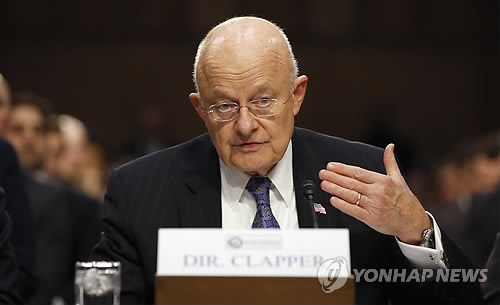Efforts to get NK to denuclearize 'probably a lost cause': US intelligence chief
By 임정요Published : Oct. 26, 2016 - 14:12
Any effort to get North Korea to give up its nuclear program "is probably a lost cause" and putting a cap on the regime's nuclear capabilities is the "best we could probably hope for," the US intelligence chief said Tuesday.
"I think the notion of getting the North Koreans to denuclearize is probably a lost cause. That is their ticket to their survival. I got a good taste of that when I was there about how the world looks from their vantage and they're under siege and they're very paranoid," Director of National Intelligence James Clapper said during a Council on Foreign Relations discussion.

"So the notion of giving up their nuclear capability, whatever it is, is a nonstarter with them ... The best we could probably hope for is some sort of a cap, but they're not going to do that just because we ask them. There's going to have to be some significant inducements," he said during the event in New York that was live-streamed on the CFR's website.
State Department spokesman John Kirby said, however, the US hasn't given up on the goal of denuclearization.
"Nothing has changed about our policy with respect to the North and that we want to continue to see a verifiable denuclearization of the peninsula. We want to see a return to the six-party talk process, and that means we need to see the North show a willingness and an ability to return to that process, which they haven't done yet," he said.
"What I can tell you is our policy with respect to North Korea's provocations and the resolve of the United States and the international community to trying to put adequate pressure on them to change their behavior has not changed and remains the same," he said.
Clapper also expressed serious concern about the North's missile capabilities.
"Frankly, in the case of their intercontinental ballistic missile, KN-08 specifically, neither they nor we know whether that missile works since it's never been tested. But nevertheless, we ascribe to them the capability to launch a missile that has a weapon on it that potentially could reach parts of the United States, certainly including Alaska and Hawaii," he said.
That has been the assessment of the US intelligence community for years, even though the missile has never been tested, he said, adding that the country should be prepared for the worst-case scenario.
Asked how to deal with the North, Clapper said there are a number of options, and "obviously military is one of them."
"If a military option were to be exercised, obviously we would play very heavily in that process. But that's not a decision, fortunately, that the intelligence community makes," he said.
Clapper called for greater efforts to send outside information into the North.
"What does bother me a bit is that we don't capitalize on our great weapon, which is information. And that's something they worry about a lot and their reaction to the loudspeakers being activated along the DMZ or the dropping of leaflets by NGOs over North Korea," he said, referring to non-governmental organizations.
"They go to nuts when that happens. So that is a great vulnerability I don't think we've exploited," he added.
In response to the comments on North Korea by the US intelligence chief, South Korea reaffirmed its strong commitment to get the North to go nuclear-free, saying that the stance remains in line with what Washington has been pushing for.
"Not just South Korea and the US but also the international community have an unwavering will not to tolerate the North's nukes and that will is stronger than ever," a foreign ministry official told Yonhap on condition of anonymity. (Yonhap)
"I think the notion of getting the North Koreans to denuclearize is probably a lost cause. That is their ticket to their survival. I got a good taste of that when I was there about how the world looks from their vantage and they're under siege and they're very paranoid," Director of National Intelligence James Clapper said during a Council on Foreign Relations discussion.

"So the notion of giving up their nuclear capability, whatever it is, is a nonstarter with them ... The best we could probably hope for is some sort of a cap, but they're not going to do that just because we ask them. There's going to have to be some significant inducements," he said during the event in New York that was live-streamed on the CFR's website.
State Department spokesman John Kirby said, however, the US hasn't given up on the goal of denuclearization.
"Nothing has changed about our policy with respect to the North and that we want to continue to see a verifiable denuclearization of the peninsula. We want to see a return to the six-party talk process, and that means we need to see the North show a willingness and an ability to return to that process, which they haven't done yet," he said.
"What I can tell you is our policy with respect to North Korea's provocations and the resolve of the United States and the international community to trying to put adequate pressure on them to change their behavior has not changed and remains the same," he said.
Clapper also expressed serious concern about the North's missile capabilities.
"Frankly, in the case of their intercontinental ballistic missile, KN-08 specifically, neither they nor we know whether that missile works since it's never been tested. But nevertheless, we ascribe to them the capability to launch a missile that has a weapon on it that potentially could reach parts of the United States, certainly including Alaska and Hawaii," he said.
That has been the assessment of the US intelligence community for years, even though the missile has never been tested, he said, adding that the country should be prepared for the worst-case scenario.
Asked how to deal with the North, Clapper said there are a number of options, and "obviously military is one of them."
"If a military option were to be exercised, obviously we would play very heavily in that process. But that's not a decision, fortunately, that the intelligence community makes," he said.
Clapper called for greater efforts to send outside information into the North.
"What does bother me a bit is that we don't capitalize on our great weapon, which is information. And that's something they worry about a lot and their reaction to the loudspeakers being activated along the DMZ or the dropping of leaflets by NGOs over North Korea," he said, referring to non-governmental organizations.
"They go to nuts when that happens. So that is a great vulnerability I don't think we've exploited," he added.
In response to the comments on North Korea by the US intelligence chief, South Korea reaffirmed its strong commitment to get the North to go nuclear-free, saying that the stance remains in line with what Washington has been pushing for.
"Not just South Korea and the US but also the international community have an unwavering will not to tolerate the North's nukes and that will is stronger than ever," a foreign ministry official told Yonhap on condition of anonymity. (Yonhap)





![[KH Explains] No more 'Michael' at Kakao Games](http://res.heraldm.com/phpwas/restmb_idxmake.php?idx=644&simg=/content/image/2024/04/28/20240428050183_0.jpg&u=20240428180321)












![[Herald Interview] Mistakes turn into blessings in street performance, director says](http://res.heraldm.com/phpwas/restmb_idxmake.php?idx=652&simg=/content/image/2024/04/28/20240428050150_0.jpg&u=20240428174656)
